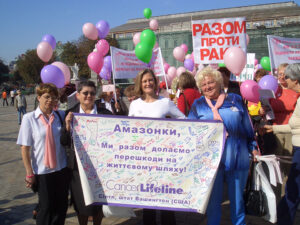Nataliia Verovkina, a medical oncologist and research fellow at the National Cancer Institute of Ukraine, is now in the town of Vinnytsia, having travelled there from Kyiv to get her son away from the war zone.
Oleksandr Stakhovskyi, a urologist and oncologic surgeon at Ukraine’s National Cancer Institute, is staying in Kyiv to treat cancer patients as the Russian invasion continues.
On March 2, a bus filled with Ukrainian children was getting ready to leave Odesa for the border of Moldova, Ukraine’s closest neighbor.
Ukrainian communities across the United States are sending essential medical and humanitarian supplies to Ukraine via organizations, including the Ukrainian Medical Association of North America, said Solomiya Grushchak, a member of UMANA.
As the war rages around them, Ukraine’s oncologists are scrambling to get cancer patients the treatment they need.
Ukraine has a special place in my heart, in my career, and in my life. A Ukrainian breast cancer project first introduced me to the field of global oncology, along with experience of seeing first-hand the challenges (and rewards) of providing cancer care and conducting cancer research in a setting of constrained resources. From my […]
In last week’s issue of The Cancer Letter, I discussed potential nuclear dangers resulting from Russia’s invasion of Ukraine (The Cancer Letter, Feb. 25, 2022). Unfortunately, several events I predicted might happen have occurred.
It was awe-inspiring to see how quickly the world’s science came together to address the COVID-19 pandemic—and much was learned. Academic institutions, big pharma, government, and foundations stepped up to do everything possible in an unprecedented way. Two years later, the results are evident as life is returning to normal.
The images from Ukraine are beyond endurance. There is nothing to say about the ethics of this conflict. A fascist autocrat who leads a confederacy of kleptocrats decides to invade a neighboring state under a KGB-honed delusion that has been out of date since the 1990s so that his nation will be “stronger” by reattaching itself to a the blasted remains of a cultural treasure.
John Mark Cleland died peacefully on Feb. 7, 2022, in Indianapolis. Some people reading this headline will have little or no idea who John Cleland was. However, if you are a medical or urological oncologist, you should. John Cleland was the first man whose metastatic testicular cancer was cured with combination chemotherapy containing cisplatin.















